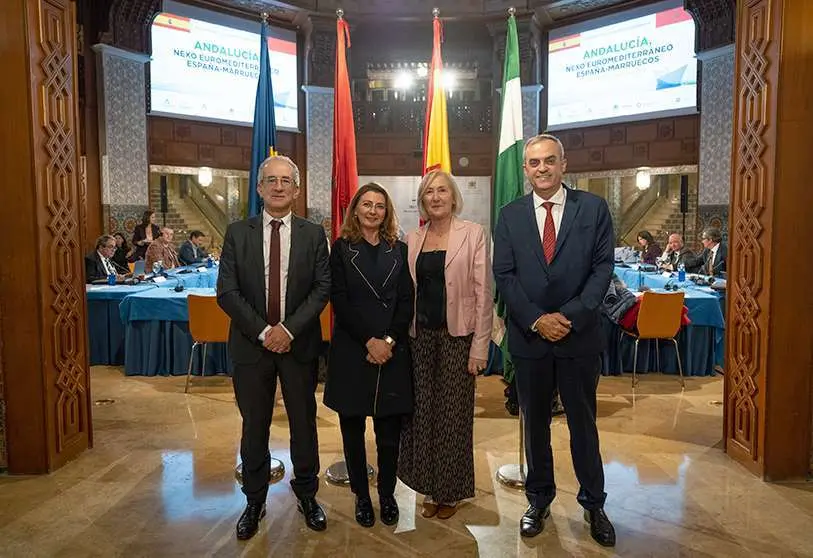“Retomar lo que teníamos en materia de educación sería perfecto”

The links between Spain and Morocco transcend historical, geographical or political frameworks. Over the last few decades, the parties have forged alliances in various fields that have served as a bridge between societies. One of these meeting points has been precisely the academic sphere, where Morocco and Spain, in this case through the autonomous community of Andalusia, have managed to unify methods, areas of research and teaching experience to improve university education.
Academic representatives from both sides of the Strait of Gibraltar have had the opportunity to compare points of view. The Andalusian Regional Government and the journal Atalayar organised the forum 'Andalusia, Euro-Mediterranean nexus Spain-Morocco' in collaboration with the Three Cultures Foundation and the International Press Club, a space for deepening Spanish-Moroccan relations.

Randa Jebrouni, research professor in the Department of Hispanic Studies at Abdelmalek Essaâdi University in Tetouan, Jamal Eddine Stitou El Messari, university professor and manager of international projects at the same university, and Arturo Chica Pérez, Vice-Rector for Internationalisation at the International University of Andalusia (UNIA), discussed the different initiatives for Spanish-Moroccan academic cooperation in a dialogue moderated by the journalist Carmen Beamonte, news director at Canal Sur Radio.
Under the title 'University Cooperation: Boosting Spanish-Moroccan Talent', Jebrouni listed dozens of cases of collaboration in this field since the beginning of the century. "From 2007 to 2016 alone, there have been a total of 176 actions by Spanish universities in Morocco. A large part of them have come, specifically, from the Andalusian University," said the professor from the Department of Hispanic Studies, most of them related to the launching of development and research programmes in scientific or social matters.

Messari highlighted the "almost three decades of cooperation in the field of education" between the academic centres of Spain and Morocco, giving as an example the hosting of Moroccan university students by the University of Cadiz. In line with what was expressed by the lecturer from the Abdelmalek Essaâdi University, El Messari highlighted the different Spanish-Moroccan projects and initiatives, although he first wanted to explain that his University is "the only centre that exists in the north of Morocco" under public ownership.
The Abdelmalek Essaâdi University is spread over six cities, where "10% of the Moroccan population is located, with an activity rate of 46%". "From an economic point of view, it is the second most important region in Morocco after Casablanca," he said. This explains why this centre is one of the main institutions with internationalisation programmes and partnerships with Spanish and Andalusian universities.

Arturo Chica Pérez told the other speakers that his centre serves the Andalusian regional government "as an instrument of internationalisation". There is, therefore, fluid cooperation with Moroccan universities, since a large number of students are of foreign origin. Moreover, they do not work alone, but in the company of other universities in the region. "The postgraduate courses [the only category in its academic offer] are inter-university," clarified the vice-rector of the International University of Andalusia (UNIA).
El Messari added to Chica Pérez's words that the Abdelmalek Essaâdi University collaborates with the UNIA "through summer courses, publications, joint conferences and specific training, among other things". The Spanish professor, for his part, pointed out that this university cooperation was inaugurated in 2016 and that, after four years at a standstill, it was resumed in 2021. At present, it is still in force in 2022.

"During the pandemic, we offered a free virtual course at the International University of Andalusia to train teachers in the use of new technologies. 150 professors from Moroccan universities enrolled," added Chica Pérez, who also proposed holding a "triangular meeting on water management with Latin American universities" for 2023. A proposal validated by his interlocutors.
For El Messari, "it would be perfect to resume what we had" before the hiatus caused by the break in bilateral relations. Chica Pérez played down the issue and stressed that they were the first "to cross the border when they opened it in May to meet with their colleagues from the Abdelmalek Essaâdi University". In fact, as a result of that visit, an agreement was signed to relaunch the collaboration.

Beamonte valued the role of the university as a "protagonist", but in reality the Spanish-Moroccan academic collaboration goes beyond this. As Jebrouni pointed out, "Morocco is the country with the most Cervantes Institutes in the world, six to be precise, and Spain devotes 15 million euros to cultural activities and studies in Morocco". The Messari added that in the North African country "the Spanish language is beginning to be introduced as a vehicular language" in educational centres. There is a future.








